
According to the Pulse of the Profession® 2023 report prepared by Project Management Institute, collaborative leadership, communication, problem-solving and strategic thinking are the four highest-ranked power skills. Additional power skills needed for project management professionals include relationship building, adaptability, innovative mindset, accountability, empathy, discipline, for-purpose orientation, future-focused orientation and leadership. Many of these desired skills are connected to general competence of Emotional Intelligence which is nowadays focused on more and more.
What is Emotional Intelligence?
Emotional Intelligence (EI) is the ability to understand, manage and apply the information and power of emotions as the greatest source of motivation, connection and influence and a core factor in relationship management. Considering EI as a competence we should notice that it can be understood as series of learned human behaviors that can be trained. EI is the ability to intentionally manage our emotions both in private and professional life. Not everyone is born with this skill but it can and should be learned and trained by all the professionals, especially the ones who want to affect the human aspect of change, natural resistance people usually have to any possible change of their status quo and the ability to inspire others in the change which is going to happen.
If we want to successfully deliver a project, especially in change management, we should focus on our ability to quickly build relationships and trust with diverse groups of people. This is fundamental to deliver change. EI can be one of the indicators we can consider when trying to estimate how well an employee will succeed in their career. From business agility perspective, Emotional Intelligence is pivotal to shape proficiency in influencing others, communication, conflict management, leadership, initiating or managing change – so in establishing an effective collaboration within the Agile team.
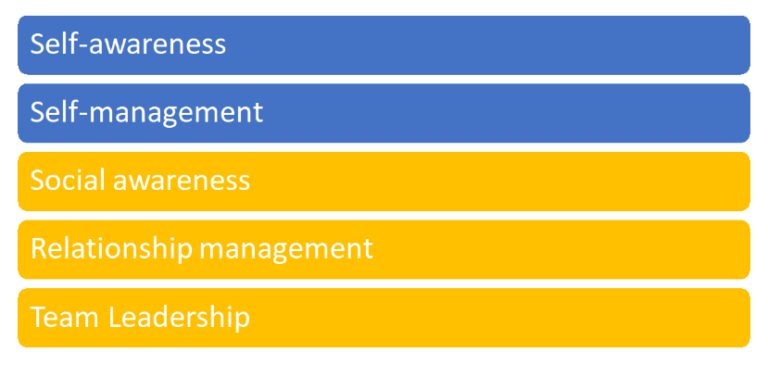
Emotional intelligence begins with deep understanding of our own emotions. Only when we are aware of them, can manage them and effectively profit from them in our daily lives we can be able to go a step further – from personal competencies dimension to social competencies.
Dimension 1 of EI: Personal competencies includes:
Dimension 2 of EI: Social competencies includes:
In Scaled Agile Framework we can find some recommendations from the Lean Portfolio Management where we can expect the impact of social skills of the project team. These can include engaging in participatory budgeting, establishing flow and stakeholder engagement through the portfolio Kanban, executing PI Planning and many more activities linked to social interaction necessary for project success.
Relationship management
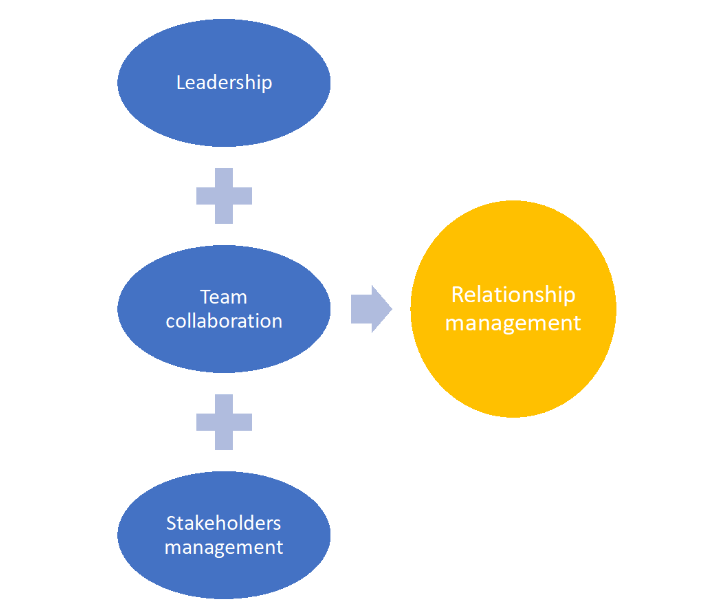
Relationship management skills are crucial to initiate and successfully deliver any project or piece of work. Social awareness and the ability to work with other people and their emotions are crucial in all the activities which require interpersonal contact. To work effectively, achieve the goals and increase job satisfaction, each team member has to focus on the relations they can build with other team members, their leaders as well as the stakeholders and clients. It is a big challenge for team leaders to work on their Emotional Intelligence skills not only to enable team collaborations and communication but above all to become a true inspirational leader who is really leading by example, as defined in one of the Lean-Agile Leadership dimensions.
Lean-Agile Leadership
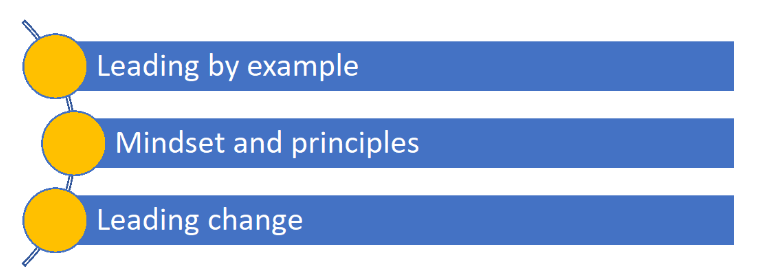
Lean-Agile Leadership is a new approach to leadership required by business agility. It starts within leaders’ behaviors and attitudes which give inspiration and motivation to all team members. Lean-Agile Leaders are not only the professionals supporting project realization – they actively lead the change, their team and are role models for the others.
Lean-Agile Leaders can become inspirational leaders by behaviors distinctive to the three dimensions of Lean-Agile Leadership:
It is crucial that Lean-Agile Leaders model and leverage different Emotional Intelligence skills and enable their team members to evolve not only business agility competencies during project realization but also their emotional and social competencies and relationship management skills. Thinking about long-term benefits for the employees the leaders have to focus on the human factor – to keep their teammates motivated and satisfied with the job they are doing. They should also provide the team the space for decision making and responsibility but also psychological safety for experimenting and innovation – as these factors are necessary for employee satisfaction.
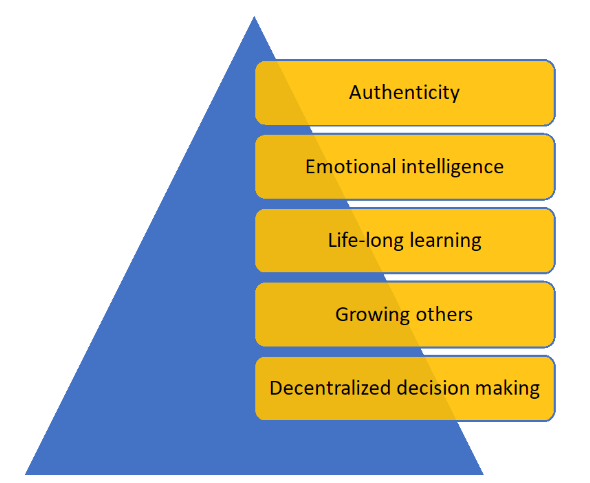
In Scaled Agile methodology we can find some behaviors that are crucial for Lean-Agile Leaders:
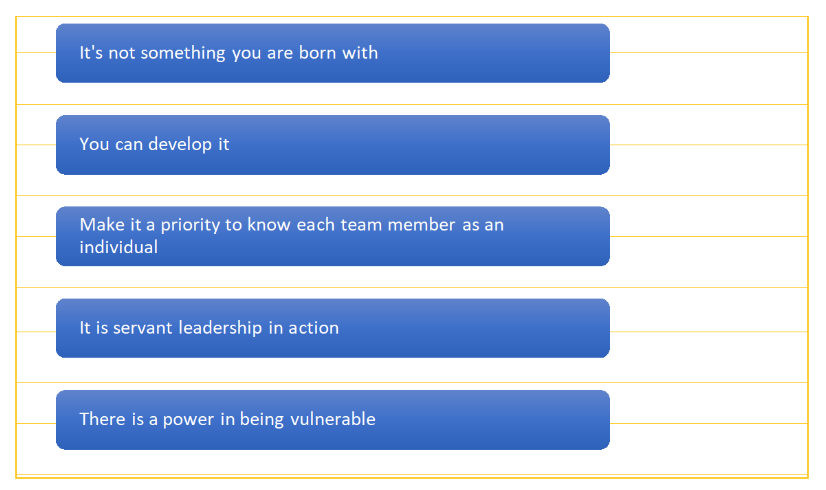
Each Leader should know that Emotional Intelligence is not a skill everyone is born with, it is a bunch of competencies that can be developed and it is important to focus on them in parallel with developing other, more technical skills. Leaders should also treat it as a priority to know their team members as individuals, to support them and keep them satisfied and motivated. Empathy is a key skill to achieve this. Lean-Agile Leadership is a servant leadership in action – by being truly supportive to the team members. And it is important to highlight that there is a power in being vulnerable and honest because this is one of the factors that make the Leaders authentic people who can be trusted by others.
Benefits of increasing Emotional Intelligence
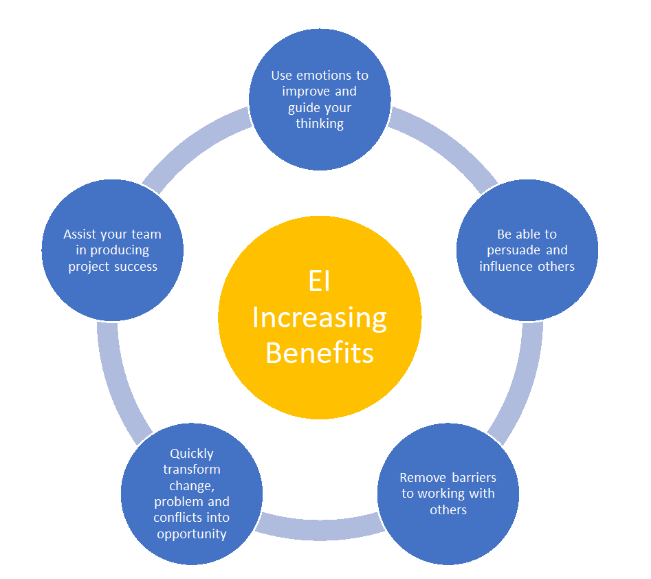
Not only Leaders, but all professionals can benefit from increasing their Emotional Intelligence. With the development of the EI skills, we can learn to use our emotions to improve our thinking and to become more conscious but also to improve our persuading and influencing other skills. With relationship management experience we are more able to remove barriers to working with others. With good communication skills we can truly assist our teams in producing the success of the project we are delivering. When the whole team develop EI competencies business agility is also enabled – team members learn how to quickly transform change, problems and conflicts into new opportunities to grow and to provide better solutions to the clients which meet changing needs.
Relationship management
At Brickendon we believe that long-term and well-managed relations are the key for the business. We focus on relationship management in all dimensions: leadership, team collaboration as well as the stakeholder’s management. Our employees and leaders develop their Emotional Intelligence competencies which are crucial for our company to become an employer of choice for the best candidates and to provide the best business solutions that meet our client’s needs. In our strategy we put people first – both employees and clients – to build long lasting cooperation which is satisfactory and gives the feeling of being a valuable part of our business.
Explore the latest Insights from Brickendon and ensure that your organisation is prepared.
Sources:
[1] https://scaledagile.com/blog/the-unparalleled-value-of-emotional-intelligence-part-one/
[2] https://scaledagile.com/blog/the-unparalleled-value-of-emotional-intelligence-part-two/
[3] https://scaledagile.com/podcast/the-value-of-emotional-intelligence/
[4] https://www.scaledagileframework.com/lean-agile-leadership/
[5] https://www.pmi.org/learning/library/emotional-intelligence-improve-project-performance-1019#
[6] https://www.pmi.org/learning/publications/pm-network/digital-exclusives/need-to-know-emotional-intelligence
[7] https://www.pmi.org/learning/thought-leadership/power-skills
[8] https://www.pmi.org/learning/library/understanding-emotional-intelligence-pm-practitioners-6023
[9] https://www.pmi.org/learning/library/emotional-intelligence-develop-abilities-skills-6628